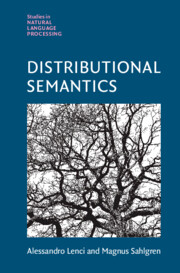9 - Distributional Semantics beyond the Lexicon
from Part III - Practice
Published online by Cambridge University Press: 07 September 2023
Summary
This chapter presents current research in compositional distributional semantics, which aims at designing methods to construct the interpretation of complex linguistic expressions from the distributional representations of the lexical items they contain. This theme includes two major questions that we are going to explore: What is the distributional representation of a phrase or sentence and to what extent it is able to encode key aspects of its meaning? How can we build such representations compositionally? After introducing the classical symbolic paradigm of compositionality based on function-argument structures and function application, we review different methods to create phrase and sentence vectors (simple vector operations, neural networks trained to learn sentence embeddings, etc.). Then, we investigate the context-sensitive nature of semantic representations, with a particular focus on the last generation of contextual embeddings, and distributional models of selectional preferences. We end with some general considerations about compositionality, semantic structures, and vector models of meaning.
- Type
- Chapter
- Information
- Distributional Semantics , pp. 282 - 352Publisher: Cambridge University PressPrint publication year: 2023

